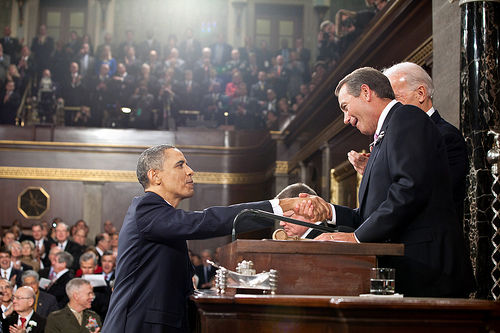
The following article is based on a Jan. 27 CPUSA National Board discussion.
President Obama soberly looked at the state of the nation earlier this week, outlined new challenges facing the country, and forcefully presented several new initiatives to restructure and renew the economy.
Combined with his success in the “lame-duck” congressional session, the acclaimed speech in Tucson and the successful summit with Hu Jintao, the president has enhanced his standing considerably since the November defeat of his party. He is the front-runner for the presidency in 2012, which is driving right-wing extremists and sections of capital into a frenzy.
Public investments in clean energy, research, infrastructure and education are the most important proposals in the State of the Union address. Renewing the infrastructural and productive base of the economy is of critical importance to the country’s future in a highly competitive global economy.
The president also spoke out against the Bush tax cuts that add $857 billion to our deficit and against tax breaks for the outrageously profitable oil monopolies – who, he added, don’t need our help.
The president aggressively defended his administration’s health care bill as well. He didn’t wave the veto pen at the Republicans in the audience, but he indicated to the nation that he was prepared to fight any legislative efforts coming from the GOP to cripple it.
President Obama navigated between many competing forces and trends, mounted a spirited defense of the role of government – not big vs. small, but mean vs. smart, active and caring. Unlike former President Bill Clinton, who beat a hasty retreat in 1995 (after the huge defeat in the 1994 midterm elections) captured by his now famous quip, “The days of big government are over,” this president made a vigorous rebuttal to his right-wing critics.
To the majority of Americans who are war weary, his restatement that a pullout of troops from Afghanistan would begin this summer was welcomed, as was his call for military spending reductions. What the president didn’t outline was a concrete withdrawal plan to remove the all the troops. It is no secret that the Pentagon and their political allies are opposed to any quick (or longer term) pullout. Nor did he address, besides a remark on the uprising in Tunisia, other sites of conflict in the world, but that was no surprise. His focus was domestic.
Another feature of the speech that was greeted in progressive circles was his reference to citizenship rights of immigrant children and the lifting of discrimination against gay people in the military.
Not least, the president repeated a theme that finds its way into most of his speeches – the idea that America is a diverse country of multi-racial, multi-ethnic, young and old, native born and immigrant, gay and straight people. This challenges the right-wing notion that the United States is essentially a White Republic.
The speech should be seen as a product of a political moment defined by the migration of independent voters to the Republican column in the fall elections, the tenacity of right-wing ideology on still too many voters, and the refusal of the business community to cooperate with the administration on many matters. Is it too strong to say that capital is on strike and thus refusing to invest the trillions of dollars in economic surplus at its disposal until its gets its way?
The speech is also a product of the lack of political and organizational capacity of the labor and people’s movement – something that AFL-CIO President Richard Trumka spoke of a week before the president’s address. And until that changes, it is difficult to see how the nation’s politics will tack too far in a progressive direction. Transformative moments require transformative mass insurgencies.
Missing in the speech was any immediate assistance to the millions who are reeling under the weight of the economic crisis – a crisis that has an end only if you live in the well-off side of town.
As important as public investment for economic renewal and jobs are, they are unlikely to get much traction in this Congress where cries for budget cutting is at a fever pitch among the Republicans. And even if they did the rollout of jobs would take time, which is what the unemployed, barely breathing under the weight of personal debt and declining income, don’t have. They need relief NOW! But Congressional Republicans have no interest in such relief! In fact, their attitude to the economic recovery is: Who needs it? After all, profits are way up notwithstanding (or because of) the economic slump, and employment stagnates, as they see it, double digit unemployment rates are their return ticket to the White House and political dominance next year.
In this regard, the president’s extension of the budget freeze was music to their ears, even though they advocate far more severe spending cuts . No matter how big or small the cuts are in the end, the poorest, the most vulnerable, the unemployed, and communities of color will feel the impact. Granted the president’s proposal pales in comparison to the cuts on the Republican wish list – $100 billion immediately and then $2.5 trillion over the next ten years. Yes! You read it right. But any cuts will hurt communities that are already staggering.
That the president didn’t make any concessions on Medicare and Social Security in his speech is a plus. The pressure on the administration to do so is enormous and it comes from congressional Republicans, some in his own party and administration, and sections of transnational corporations.
According to former Wall Street executive and Secretary of the Treasury in the Clinton administration Robert Rubin, who speaks for the “Street,” entitlement and budget reform is an imperative – a deal breaker if the administration wants any cooperation from business.
It is fair to say that the message of Rubin and his crowd of parasites (not too strong given their role in unraveling the economy and their theft of the wages and pensions of working people) is simple: “reform” Social Security and Medicare and trim domestic spending or we will invest our money elsewhere and throw the economy into another dip downward.
The mushrooming of debt is a problem to our economic future to be sure. And economic growth alone is not a solution to the debt buildup. But, debt is not at catastrophic levels, nor are the only solutions to this crisis the hollowing out of Social Security and Medicare.
Don’t believe the media hype that we are about to fall into a dark hole like Greece, Ireland, and Iceland did.
The State of the Union didn’t settle anything, but what it did do is frame the struggle in the coming period. In some instances the president framed things to the people’s advantage; in other instances he made concessions to his opponents.
No one in their right mind should expect him to present a left alternative given the balance of class forces and his own political sensibilities. All we can ask for is that the speech provides labor, progressives and allies some openings to push forward on. And it did that. It’s up to the labor and people’s movements now.
Photo: President Barack Obama shakes hands with Speaker of the House John Boehner before delivering the State of the Union address at the U.S. Capitol in Washington, D.C., Jan. 25, 2011. (Official White House Photo by Pete Souza)












Comments